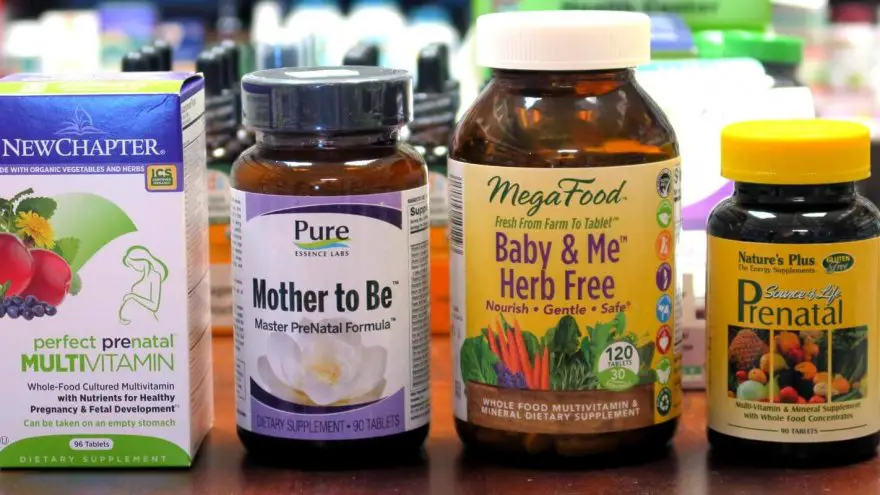Pick The Perfect Prenatal Vitamins

Eating a balanced and healthy diet is critical to avoiding illnesses, improving mental function, increasing energy levels, and a host of other health benefits. This is especially important for women leading up to and during a pregnancy. For most expectant mothers however, even the best efforts to maintain healthy eating practices may not be enough to ensure both mom and baby are getting the recommended daily allowances of certain vitamins and minerals.

In an effort to bridge the gap, many doctors include prenatal vitamins as a component to a complete nutritional plan. But whether your doctor gives you a list of optional choices or you find yourself standing in the aisle of the supermarket, knowing which one to take can be a daunting choice. Specific individual needs can help you decide which prenatal vitamin will give you the most benefit, while also avoiding wasting your time and money on the wrong supplement.
Folic Acid
Finding a vitamin with the proper amount of folic acid is towards the top of the list when it comes to prenatal care. Taking a prenatal vitamin that contains 400 micrograms, (4 milligrams), of folic acid can reduce the chances of neural tube defects, preeclampsia, heart defects, and other early gestation complications by up to 70%. Folic acid also helps your body to make red blood cells as well as prevent anemia. Additionally, folic acid is key for making and repairing DNA. For expectant mothers that are either trying to conceive or are in the early terms of their pregnancy, folic acid is especially important for cell production of the placenta. By discussing your current diet as well as any adjustments you can make through your meals with your doctor, you can select a vitamin supplement that will ensure that you’re get the recommended amounts each day.
Calcium
While it’s widely known how calcium is vital to bone development, it has several other benefits for both pregnant mothers and their growing baby as well. Calcium also fundamental for the growth of healthy muscles and nerves, as well as reducing the risk of preeclampsia and hypertension. When you aren’t getting the adequate amount of calcium, your baby is going to leech it from your own bones, a problem that can cause bigger issues down the road for you. For many women, dietary restrictions make supplemental calcium even more import. In instances such as lactose intolerance or if you are vegan, the calcium in many prenatal vitamins may not be enough, however. Like most supplements, finding a vitamin that is part of a comprehensive meal plan is key. Foods such as kale, white bread, and orange juice can help those who follow a vegan diet reach their recommended amounts, (1,000 milligrams a day for women ages 19-50), and a well-rounded diet that includes plenty of foods like yogurt, cheese, and other dairy products will keep non-vegan expectant mothers on track.
Iodine
For your baby’s brain development, iodine shouldn’t be overlooked when you’re selecting the right prenatal vitamin. Other benefits to having the proper amount of iodine include regulating your baby’s metabolism as well as your thyroid. The good news is that most Americans get enough iodine through a proper diet, and prenatal vitamins should not be considered an adequate amount on their own. If you experience depression, fatigue, unexpected weight gain, or an intolerance for cold, speak to your doctor and see if you may have an iodine deficiency that can be corrected with the right supplement. The goal for pregnant women is around 220 micrograms, though you will want to increase that to about 290 micrograms while you are lactating or breastfeeding.
Iron
Iron is another mineral that deserves a conversation with your doctor in order to see if you’re getting the right amount. Iron deficiency has been linked to fatigue, premature birth, and other birth defects in newborns. That doesn’t necessarily mean rush out and grab an iron supplement though. While pregnant women need around 27 milligrams each day, the good news is that plenty of foods found in a healthy diet will help supply that amount. Some women may find that due to their bodies producing extra blood for the baby that they experience some degree of iron deficiency. This can be especially true for women that are vegetarians or vegans because you find Heme iron, the form of iron that is most easily absorbed by the body, in meats like beef, pork, and poultry. While vegetables and legumes can contain good levels of iron, it is often non-heme iron and can be difficult to compensate for any prenatal iron deficiency. If you are vegan or vegetarian, be sure to include vitamin C rich foods with your meals as it will help your body absorb non-heme iron. If you feel like you may have an iron deficiency, talk with your doctor about getting blood work done to check. If your diet is already high in iron-rich foods, you can choose a prenatal vitamin that’s lower in iron, as taking too much when it isn’t needed can result in issues such as constipation, nausea, or diarrhea, to name a few.
Other Nutrients
Aside from just the previously mentioned vitamins and minerals, the balance of nutrients that a prenatal vitamin can offer needs to be considered as well. Again, don’t simply assume that you need the full recommended daily allowance of these solely from a prenatal vitamin, but rather speak to your doctor about your specific dietary needs based on many factors. Certain diets, preexisting medical conditions, carrying multiple babies such as twins or triplets, and many other factors will determine the amounts of added nutrients that your body requires during pregnancy. Ingredients such as thiamin and riboflavin can increase your energy levels, pyridoxine can alleviate morning sickness, and zinc can help produce insulin as well as enzymes; just to name a few. Try to get the majority of these nutrients from the foods that you eat every day, but fill in any gaps with the correct prenatal vitamin.
Dietary Problems and Restrictions
Being pregnant can lead some women to stop a specific dietary plan such as veganism for the sake of using foods rather than prenatal vitamins to make sure that they get the required nutrition. This isn’t always the choice or even necessary however. Choosing a prenatal vitamin that compensates for dietary lifestyles or restrictions can help fill those gaps in your specific diet. For some mothers, the price of eating a balanced diet can make it difficult to get all the nutrients and minerals that they need. It’s a fact of life that in many cases bad foods are often cheap foods. Easy to make, long shelf lives, and usually high in sodium and preservatives, these foods don’t offer the best nutrition. Because of this, some families may be forced to select meals that lack the appropriate quality needed for women who are pregnant or trying to become pregnant. Understanding what dietary value your food provides will help you select the prenatal vitamin that is most effective for you.
Minimal Ingredients
Often times, vitamin companies load their products with either unnecessary ingredients or simply too much of an ingredient that people do not need in those amounts. The best-case result is that you end up wasting your money because your body just cannot absorb those levels of certain micronutrients and the worst-case scenario is that you can over toxify your system. By relying on consumers lack of awareness, some companies can claim that their product boasts 200% or even more of certain ingredients. In many instances, searching for prenatal vitamins with minimal ingredients not only saves your wallet by limiting it to just what you need, but also keeps you from taking unnecessary or dangerous levels of certain ingredients. Again, be sure to talk with your doctor about your diet and then choose a vitamin that only address your specific dietary needs without a lot of over inflated ingredients.
Cost Effectiveness
There is no shortage of vitamin companies out there that not only overload their products with unneeded ingredients, but also jack up their prices to reflect it. Money that is wasted on these products can be redirected into increasing the value of the foods you eat instead, which is the preferred method of making sure you’re getting all of the nutrition that you and your baby needs. Also consider how many pills equal a single dose of vitamins. For instance, if you do the math for a bottle of prenatal vitamins and you find that a single capsule equals $0.15 and a 60-pill bottle requires you to take 2 pills per serving, you’re paying $0.30 a serving where as another supplement may only require a single pill to reach the same nutritional value at the same $0.15 per capsule. The good news is that there is no shortage of cost-effective options on the market today.
Independent Seal of Approval (ISA)
Whichever prenatal vitamin that you’re looking at, it may be worth your consideration to check for an independent seal of approval. Many dietary supplement’s claims are not verified by the Food and Drug Administration to ensure that they contain the amounts of ingredients that they claim. An ISA is a 3rd party organization that checks the purity as well as the quality of ingredients using rigid criteria. If you’re considering a prenatal vitamin, it would be wise to check if it has been tested and evaluated by one of these companies. Since they contain concentrated or even hard to come by ingredients, you’ll feel better knowing that you’re not only getting what you paid for, but also the levels that your doctor recommends that you take.
Being Easy on the Stomach
Multi-vitamins are notorious for making people nauseous when they take them. When it comes to prenatal vitamins, women who are already experiencing uneasy stomach problems such as morning sickness or just how their body reacts to certain foods now that they are pregnant can become discouraged by the added stress on their digestive systems. The good news is that there are a variety of prenatal vitamin options out there on the market and odds are good that you can find one that won’t upset your stomach. Vitamins high in iron and other minerals, whether you take them on empty stomachs or not, and a variety of other factors can have very different effects on individuals; what works for some people may not necessarily work for others. That is why it’s important to discuss any effects on your body that your prenatal vitamin may have as they can likely pinpoint the problem and suggest a replacement that will be easier for you to take each day.
Don’t Overdo It
Falling under the notion that too much of a good thing can be a bad thing, avoid overdoing it with prenatal vitamins. Unnecessary ingredients and their amounts can cause more harm than good. By following a balanced diet and understanding what exactly your specific needs are you can avoid overloading your system. Because theses vitamins possess concentrated forms of minerals and nutrients, taking them when your body does not need them increases the risk of complications.

Additionally, you should stick to just one supplement rather than multiple different ones. If your prenatal vitamin is lacking in some key ingredient that you need, rather than taking another brand in addition, try and increase certain types of foods you eat instead to balance out your requirements.
Talk with your Doctor
No amount of internet research can substitute regular check-ups with your Health Care Provider whether it be a midwife or a
Eating a balanced and healthy diet is critical to avoiding illnesses, improving mental function, increasing energy levels, and a host of other health benefits. This is especially important for women leading up to and during a pregnancy. For most expectant mothers however, even the best efforts to maintain healthy eating practices may not be enough to ensure both mom and baby are getting the recommended daily allowances of certain vitamins and minerals. In an effort to bridge the gap, many doctors include prenatal vitamins as a component to a complete nutritional plan. But whether your doctor gives you a list of optional choices or you find yourself standing in the aisle of the supermarket, knowing which one to take can be a daunting choice. Specific individual needs can help you decide which prenatal vitamin will give you the most benefit, while also avoiding wasting your time and money on the wrong supplement.






